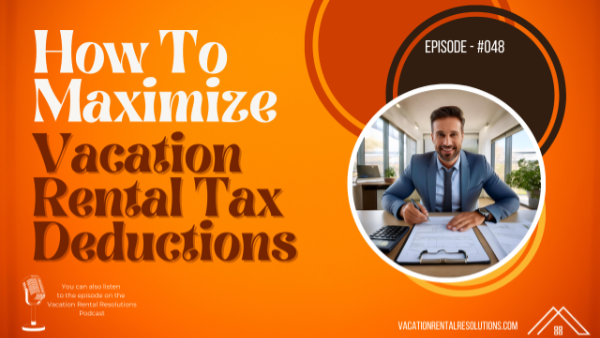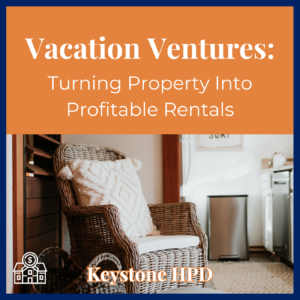Table of Contents
- 1
- 1.1 Discover effective strategies to maximize your Vacation Rental tax deductions and boost your profits.
- 1.1.1 Income Tax Considerations for Vacation Rentals
- 1.1.2 The 14-Day Rule: A Key Tax Exemption
- 1.1.3 Differentiating Personal Use and Rental Use
- 1.1.4 Maximizing Deductible Expenses
- 1.1.5 List of Deductible Expenses for Vacation Rentals
- 1.1.6 Navigating Local Tax Considerations
- 1.1.7 Understanding Occupancy Taxes
- 1.1.8 Complying with State and Local Laws
- 1.1.9 Best Practices for Effective Tax Management
- 1.1.10 In Conclusion
- 1.2 How To Use Guest Video Testimonials to Boost Bookings-111
- 1.3 Why Do People Click “Book Now”? Guest Booking Psychology Behind Vacation Rental Decisions-110
- 1.4 How to Create a Foolproof Cleaning Checklist for Rentals-109
- 1.5 Maximising Vacation Rental Reviews Without Nagging Your Guests-108
- 1.6 How Much Should a Vacation Rental Actually Make?-107
- 1.7 How Do You Discover Your Vacation Rental Hosting Style?-106
- 1.1 Discover effective strategies to maximize your Vacation Rental tax deductions and boost your profits.
Discover effective strategies to maximize your Vacation Rental tax deductions and boost your profits.
Vacation rental owners need to navigate a complex tax landscape to ensure compliance and maximize deductions. Today, I will talk about how to manage taxes related to rental income and understand the local tax system.
Income Tax Considerations for Vacation Rentals
Understanding income tax implications is crucial for vacation rental owners. Knowing the rules can save you from unexpected tax liabilities and help you maximize your deductions. The regulations I’m going to share apply to the United States. Make sure to check where you are to see if they apply.
.
.
The 14-Day Rule: A Key Tax Exemption
In the U.S, if you rent out your property for 14 days or less in a year, you are not required to report the rental income on your tax return. This rule provides a significant benefit, allowing short-term rental income to remain tax-free. However, if the rental period exceeds 14 days, all rental income must be reported to the IRS, making it essential to track your rental days meticulously.
.
.
Differentiating Personal Use and Rental Use
The IRS distinguishes between personal use and rental use of your property. Personal use includes time spent by you, your family, or anyone paying less than fair market rent. This classification impacts your tax deductions. For instance, if the property is primarily used personally, the number of deductible expenses might be limited compared to a property used solely for rental purposes.
.
.
Maximizing Deductible Expenses
Deducting eligible expenses can significantly reduce your taxable income, improving your overall profitability.
.
.
List of Deductible Expenses for Vacation Rentals
You can deduct a variety of expenses, such as repairs and maintenance, cleaning services, property management fees, insurance, utilities, taxes, marketing, accounting fees, supplies, and travel expenses related to property management. Keeping meticulous records, including receipts and invoices, is crucial to support your deductions in case of an audit.
.
.
Navigating Local Tax Considerations
Local tax regulations are another critical aspect of vacation rental management. Compliance with these regulations ensures smooth operations and avoids legal issues.
Understanding Occupancy Taxes
Many jurisdictions require hosts to collect occupancy taxes from guests. These taxes, also known as hotel or transient lodging taxes, can be collected and remitted by platforms like Airbnb on your behalf. Understanding your local requirements helps avoid penalties and ensures compliance.
.
.
Complying with State and Local Laws
Tax laws can vary significantly between states and even cities. Researching and adhering to local regulations, including required licenses or permits, is essential. Non-compliance can result in fines or other legal repercussions, impacting your rental business.

Best Practices for Effective Tax Management
Implementing best practices can simplify tax management and enhance compliance.
1. Maintaining Accurate Records
Keeping detailed records of all income and expenses is fundamental. Using accounting software or spreadsheets can help track transactions efficiently. Accurate records ensure you can substantiate your deductions if audited.
.
2. Separating Business and Personal Finances
Using a separate bank account for your vacation rental business helps avoid mixing up your funds. This separation simplifies accounting and ensures a clear distinction between personal and business expenses.
.
3. Understanding and Utilizing Tax Deductions
Familiarizing yourself with available deductions is vital for minimizing tax liability. This knowledge helps you make informed decisions about your rental operations and financial planning.
.
4. Filing Quarterly Taxes
If you anticipate owing $1,000 or more in taxes, making quarterly estimated tax payments is necessary. This practice helps avoid penalties and interest on underpaid taxes.
.
5. Providing W-9 Forms
Submitting W-9 forms to rental platforms ensures that they do not withhold part of your rental income. Proper documentation facilitates smooth transactions and accurate income reporting.
.
6. Seeking Professional Help
Tax laws for vacation rentals can be complex. Consulting with a tax professional specializing in rental properties can help ensure compliance and maximize deductions. Their expertise can provide tailored advice, optimizing your tax outcomes.
.
7. Staying Informed
Tax laws and regulations can change. Keeping up-to-date with current rules in your area ensures ongoing compliance and helps you adapt to new requirements.
 Are you ready to transform your vacation rental into a five-star experience? Our exclusive guide, ‘Unpacking Your Property – The Top 25 Secrets to Successful Vacation Properties,’ is your ticket to unlocking the full potential of your property. It’s not just a guide; it’s your roadmap to becoming the go-to rental in your area. Download it for free and start your journey to the top today!
Are you ready to transform your vacation rental into a five-star experience? Our exclusive guide, ‘Unpacking Your Property – The Top 25 Secrets to Successful Vacation Properties,’ is your ticket to unlocking the full potential of your property. It’s not just a guide; it’s your roadmap to becoming the go-to rental in your area. Download it for free and start your journey to the top today!
Do you have any unique tax strategies that have worked for your vacation rental business?
Share your experiences in the comments below!
In Conclusion
Understanding and managing the tax implications of your vacation rental property ensures compliance with tax laws while maximizing your potential deductions. Implementing these strategies provides peace of mind, knowing that your financial management is robust and compliant.
.
In the next episode, I will talk about Improving Your Vacation Rental Sleep Quality.
⇒ TO READ OR LISTEN TO THIS EPISODE ON KEYSTONE HOSPITALITY PROPERTY DEVELOPMENT
.
Serious about taking your business to the next level? Sign up for the “Vacation Ventures: Turning Property Into Profitable Rentals” course
.
Grab your copy of the “Unlock the Full Potential of Your Property: Top 25 Secrets for Vacation Rental Success” PDF
vacationrentalresolutions.com/25-secrets-for-vacation-rental-success
.
Join our groups
.
Listen to The Hospitality Property School PODCAST here
Vacation Rental Resolutions Podcast
.
YouTube Channel
Gerry MacPherson
A Division of Keystone Hospitality Property Development
How To Use Guest Video Testimonials to Boost Bookings-111
- Gerry MacPherson
- February 26, 2026
Why Do People Click “Book Now”? Guest Booking Psychology Behind Vacation Rental Decisions-110
- Gerry MacPherson
- February 19, 2026
How to Create a Foolproof Cleaning Checklist for Rentals-109
- Gerry MacPherson
- February 12, 2026
Maximising Vacation Rental Reviews Without Nagging Your Guests-108
- Gerry MacPherson
- February 5, 2026
How Much Should a Vacation Rental Actually Make?-107
- Gerry MacPherson
- January 29, 2026
How Do You Discover Your Vacation Rental Hosting Style?-106
- Gerry MacPherson
- January 22, 2026








